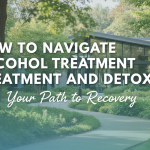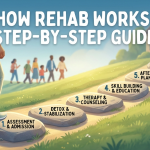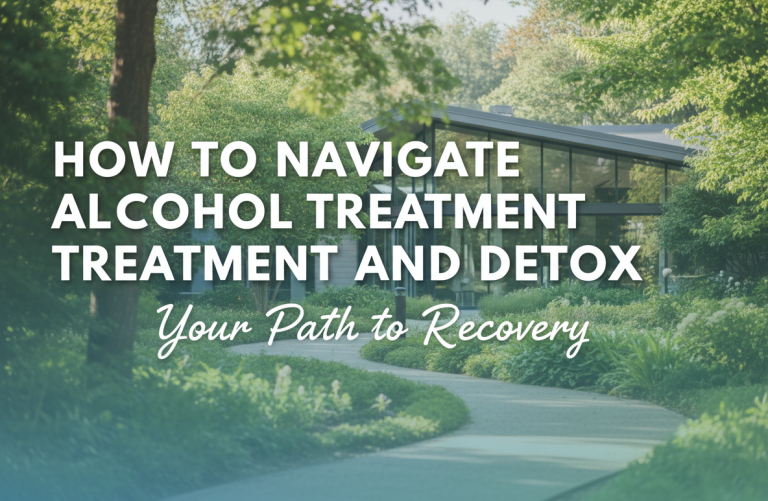Substance use disorders are persistent and complex and affect both the brain, and behavior. The first crucial step in recovery for a person who attempts to stop using drugs or alcohol is detoxification. The drug and alcohol detox is a medically supervised cleansing that removes the taint of harmful substances from the body and cushions the often painful and dangerous withdrawal symptoms that ensue.
This can equip people and their loved ones to be ready for the best or the worst during detox. Things to know if you are searching for information about detox from alcohol, detox for the test, or professional help – all that you need to know is here.
What is Drug and Alcohol Detox?
Drug and alcohol detox is the method of eliminating of toxic drugs and alcohol from the body after excessive intake of these substances for a long time. Detoxing is not a treatment for addiction but a prerequisite that must be accomplished before therapy and counseling can start. The main purpose is to regulate the progression of symptoms and maintain mental and physical stability.
The detox can range in intensity depending on the substances used, the length of use and co-occurring mental health issues can also influence the severity, and an individual’s overall health. For many, medical supervision is of vital importance, particularly during alcohol detox owing to the possibility of life-threatening complications.
Detox may take place in more than one of the following settings:
- Inpatient detox centers
- Outpatient detox programs
- Hospital-based detox units
- Specialized drug detox centers
There are numerous questions that people will have especially in regards to over-the-counter or home medicines including the drug detox drink and the best detox for a drug tests. Although such may occasionally be used in a specific testing measure, they are not efficacious or safe measures for addiction recovery in the long term.
What Happens During Detox?
The detox process is usually divided into various processes. Though experiences are not uniform from person to person, you can reasonably anticipate some things across the process.
Evaluation
Medical experts make a complete evaluation of the individual at the beginning of the detox process (which entails f).
- Medical history and physical examination
- Substance use history
- Blood and urine testing
- Mental health screening
It makes it possible to create a detox plan adjusted to the patient’s needs. For instance, a person who is detoxing from alcohol after years of heavy drinking will need a completely different kind of care than one detoxified on opioids or stimulants
Stabilization
Stabilization is the term for controlling withdrawal symptoms by medication, hydration, nutrition and psychological care. Some common medications include:
- Benzodiazepines to stop seizures and reduce anxiety during alcohol detox
- For detoxification from opioids, methadone and buprenorphine.
- Anticonvulsants and antipsychotics (if co-occurring symptoms occur).
At this stage, the medical personnel are monitoring the vital signs of the person, giving him/her the support it is necessary, and gradually preparing for longer-term healing.
Withdrawal Symptoms
Withdrawal symptoms can either be mild or severe, depending on the drug and the extent of dependence. Common symptoms include:
Alcohol Detox Symptoms:
- Anxiety or depression
- Insomnia
- Sweating and shaking
- Nausea and vomiting
- Hallucinations or seizures in severe cases.
The alcohol detox timeline is worth understanding. Symptoms may start from 6 or more hours after the last drink and peak within 24-72 hours. But psychological symptoms may continue for weeks.
Drug Detox Symptoms:
- Muscle aches and cramps
- Irritability and agitation
- Nausea and vomiting
- Sleep disturbances
- Drug cravings
Trying to detox without supervision of the medication can be risky. Although there are many looking for how to detox from alcohol abuse or drug test detox options at home, the safest way is always in the hands of professional guidance.
Transition to Treatment
It is not enough to detox to achieve lasting recovery. Once the physical process is complete, people will tend to be told to get into the inpatient/outpatient treatment program. These programs do therapy, peer support, relapse prevention, and long-term sobriety strategies.
Benefits of Drug and Alcohol Detox
The choice to follow a detox under medical supervision offers a lot of advantage over quitting “cold turkey” or trying home remedies.
1. Medical Safety
Alcohol and benzodiazepines are substances that cause lethal symptoms during withdrawal. Medically supervised detox means constant supervision and emergency care, if necessary, for alcohol detox.
2. Professional Support
Addiction is a physical and mental problem. The amount of access to doctors/nurses/counselors one has can make the experience less frightening and easier to manage. These professionals know how to detox from one’s alcohol or drugs safely and effectively.
3. Reduced Relapse Risk
Pain and discomfort of withdrawal without support drive most people back to substance use. Detox programs utilize medications and therapy within detox program to relieve symptoms and thereby decrease the risk of early relapse.
4. Customized Care Plans
A person’s detox experience is individual. Whether it’s detox from alcohol, opioids or others, individualized care results in better outcomes. This is why the treatment offered in drug detox centers depends on the individual.
5. Emotional Stability
A large number of individuals who enter detox have concomitant mental health disorders such as anxiety or depression. With professional support being able to cope with these challenges and be in a relatively stable environment for healing.
6. Foundation for Long-Term Recovery
Detox is just the beginning. Successful detox in and of itself can then provide a clarity and stability that is necessary to continue on with further addictive treatment such as cognitive behavioral therapy (CBT), in-group therapy, and 12 steps.
Conclusion
Detox is the life-saving initial step in overcoming addiction, whether detoxing from alcohol, opioids, or other substances. Although uncomfortable and draining on the emotions, medically supervised detox provides for safety and comfort with an increased likelihood of success.
Detox should not be confused with a cure for addiction; it is the steps into recovery. If you or someone dear experiences a problem with substance abuse and is seeking drug detox centers, then do not hesitate, contact them now for help.

Whether you want to know how to detox from alcohol, the best detox for a drug test, or you need someone to help a loved one to cleanse themselves, all you need is Orlando Treatment Solutions. We offer compassionate, medically supervised detox and individualized treatment plans to help you regain control over your life and nothing to do with addiction.



























